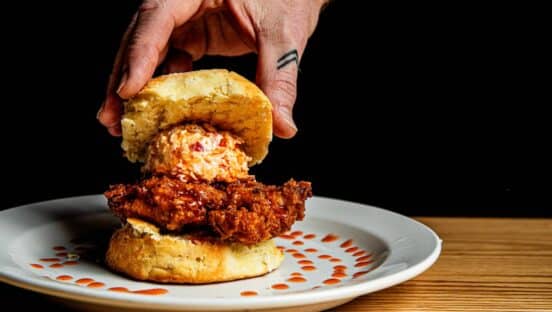The Holland-Burgerville was honored October 9 with Washington’s top environmental award for its support of wind power and organic farming and ranching, and for educating customers on environmental stewardship.
The Vancouver-based company received 2007 Governor’s Award for Pollution Prevention and Sustainable Practices in a ceremony at the state capitol. The Holland-Burgerville is among 11 companies and agencies Washington recognized this year for their success in moving the state towards a more sustainable future.
“These winners represent the best of the best at protecting the environment while running profitable businesses,” said Jay Manning, Department of Ecology Director. “I never fail to be impressed by the creativity and vision displayed by these award winners. They show that in Washington you can protect the environment and succeed commercially at the same time.”
The Holland, Inc., owner of the Burgerville restaurant chain in Washington and Oregon, leads the way in their industry. The company buys renewable wind power credits for all of the electricity in the 39 restaurants. Their example has led many others in the community to adopt wind power. All restaurants recycle their used cooking oil into biodiesel fuel. They are piloting a paper and food waste composting program at the Salmon Creek restaurant.
The restaurants focus on serving food that is “local, fresh and sustainable.” They buy their beef, turkey, bread, cheese, eggs, and produce from ranchers and farmers who support more sustainable practices. They won the Food Network national award for the Best Better Burger. They support their employees with a good health insurance program and have cut their turnover in half.
The numbers: Recycle 7,500 gallons/month cooking oil into biofuel. Wind power reduced carbon dioxide production by 17.4 million pounds/year. www.thehollandinc.com/
The award winners reduced or even eliminated their use of toxic materials, applied key principles of sustainability, and conserved resources that otherwise would have been consumed.
The 2007 winners are:
Franklin Transit, Richland—a public transit agency, pioneered new fuel blends of ethanol and bio-diesel and sponsored forums on sustainability and “liveable communities.” www.bft.org/
Biokleen Industries, Vancouver—manufactures non-toxic, concentrated cleaners and participated in setting the national standards for “green” cleaners. www.biokleenhome.com/home
Chambers Creek (Pierce Co.) Regional Wastewater Treatment Plant, University Place—designed and built a facility that makes high quality, readily usable fertilizer from biosolids while eliminating the use of 90 tons of toxic chemicals per year. www.piercecountywa.org/pc/abtus/ourorg/pwu/sewer/wwtp/ccwtp.htm
Lummi Island Wild, Lummi Island—uses the traditional method of reef netting to selectively catch salmon while protecting vulnerable species. They power their net winches with solar panels, a world first for commercial fishers. www.lummiislandwild.com/
Materials and Resources Management – WSU, Pullman— leading the country in higher education facilities with their integrated system for buying, using and disposing of materials, and promote the school’s participation in testing new products and ideas. www.surplus.wsu.edu/
Mountain Gear, Spokane Valley—sells outdoor clothing and equipment worldwide. They followed “green building” standards in remodeling their facility and serve as a real-life model for commercial green building. www.mountaingear.com/
SEH America, Vancouver—manufactures silicon wafers using innovative processes that eliminate 270,000 pounds of chromium-contaminated wastewater and the use of 47,000 pounds of isopropyl alcohol per year. www.sehamerica.com/
The Evergreen State College, Olympia—built the first higher education building in Washington to be Gold-level certified Gold by Leadership in Energy and Environmental Design. Offer courses in sustainability and use sustainable practices on-campus. www.evergreen.edu/
Whitman Mission National Historic Site, Walla Walla—uses solar power for some of their energy, conserves water, buys recycled products, and composted 47 tons of yard waste in 2006 rather than landfilling it. www.nps.gov/whmi
Yelm Earth—sells organic soil amendments and crops, and home kits. They educate the public and participate in research on the benefits of vermicomposting. www.yelmworms.com/
The Governor’s Award for Pollution Prevention and Sustainable Practices began in 1991. It will honor its 110th winner this year. An external panel of pollution prevention and sustainability experts select the winners, after an extensive review by Ecology staff. The Hazardous Waste and Toxics Reduction Program of the Department of Ecology administers the award program for the Governor.



